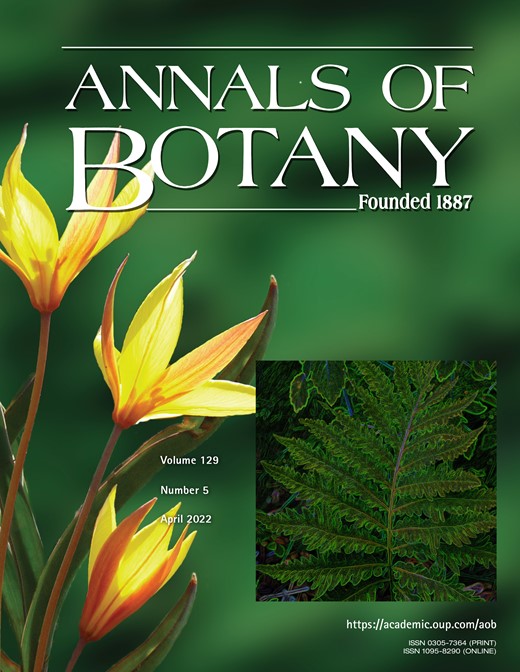View Item
- xmlui.general.dspace_homeCentros e Institutos de InvestigaciónCICVyA. Centro de Investigación en Ciencias Veterinarias y AgronómicasInstituto de BiotecnologíaArtículos científicosxmlui.ArtifactBrowser.ItemViewer.trail
- DSpace Home
- Centros e Institutos de Investigación
- CICVyA. Centro de Investigación en Ciencias Veterinarias y Agronómicas
- Instituto de Biotecnología
- Artículos científicos
- View Item
A fungal protease named AsES triggers antiviral immune responses and effectively restricts virus infection in arabidopsis and Nicotiana benthamiana plants
Abstract
Background and Aims: Plants have evolved complex mechanisms to fight against pathogens. Among these mechanisms, pattern-triggered immunity (PTI) relies on the recognition of conserved microbe- or pathogen-associated molecular patterns (MAMPs or PAMPs, respectively) by membrane-bound receptors. Indeed, PTI restricts virus infection in plants and, in addition, BRI1-associated kinase 1 (BAK1), a central regulator of PTI, plays a role in antiviral resistance.
[ver mas...]
Background and Aims: Plants have evolved complex mechanisms to fight against pathogens. Among these mechanisms, pattern-triggered immunity (PTI) relies on the recognition of conserved microbe- or pathogen-associated molecular patterns (MAMPs or PAMPs, respectively) by membrane-bound receptors. Indeed, PTI restricts virus infection in plants and, in addition, BRI1-associated kinase 1 (BAK1), a central regulator of PTI, plays a role in antiviral resistance. However, the compounds that trigger antiviral defences, along with their molecular mechanisms of action, remain mostly elusive. Herein, we explore the role of a fungal extracellular subtilase named AsES in its capacity to trigger antiviral responses.
Methods: In this study, we obtained AsES by recombinant expression, and evaluated and characterized its capacity to trigger antiviral responses against Tobacco mosaic virus (TMV) by performing time course experiments, analysing gene expression, virus movement and callose deposition.
Key Results: The results of this study provide direct evidence that exogenous treatment with recombinant AsES increases a state of resistance against TMV infection, in both arabidopsis and Nicotiana benthamiana plants. Also, the antiviral PTI response exhibited by AsES in arabidopsis is mediated by the BAK1/SERK3 and BKK1/SERK4 co-receptors. Moreover, AsES requires a fully active salicylic acid (SA) signalling pathway to restrict the TMV movement by inducing callose deposition. Additionally, treatment with PSP1, a biostimulant based on AsES as the active compound, showed an increased resistance against TMV in N. benthamiana and tobacco plants.
Conclusions: AsES is a fungal serine protease which triggers antiviral responses relying on a conserved mechanism by means of the SA signalling pathway and could be exploited as an effective and sustainable biotechnology strategy for viral disease management in plants.
[Cerrar]

Author
Fuente
Annals of Botany 129 (5) : 593-606 (Abril 2022)
Date
2022-04
Editorial
Oxford University Press
ISSN
0305-7364
Documentos Relacionados
Formato
pdf
Tipo de documento
artículo
Proyectos
(ver más)
INTA/2019-PD-E6-I116-001/2019-PD-E6-I116-001/AR./Identificación y análisis funcional de genes o redes génicas de interés biotecnológico con fin agropecuario, forestal, agroalimentario y/o agroindustrial.
INTA/2019-PD-E4-I085-001/2019-PD-E4-I085-001/AR./Determinación de los mecanismos de resistencia a enfermedades mediante la caracterización de las interacciones moleculares en sistemas planta-patógeno.
Palabras Claves
Derechos de acceso
Restringido
 Excepto donde se diga explicitamente, este item se publica bajo la siguiente descripción: Creative Commons Attribution-NonCommercial-ShareAlike 2.5 Unported (CC BY-NC-SA 2.5)
Excepto donde se diga explicitamente, este item se publica bajo la siguiente descripción: Creative Commons Attribution-NonCommercial-ShareAlike 2.5 Unported (CC BY-NC-SA 2.5)

